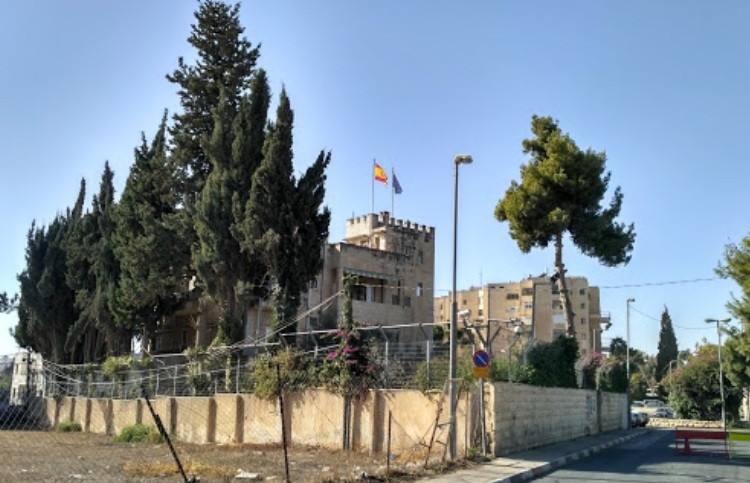The Diplomat
The Israeli government yesterday announced its decision to “sever the connection between Spain’s representation in Israel and the Palestinians” and “prohibit” the Consulate in Jerusalem from providing services to Palestinians living in the West Bank.
The decision was communicated by the Israeli foreign minister, Israel Katz, who said it was taken “in response to Spain’s recognition of the Palestinian state and the anti-Semitic statements by the deputy prime minister not only to recognise a Palestinian state but to ‘liberate Palestine from the river to the sea’. “I have decided to cut the connection between the Spanish representation in Israel and the Palestinians and to prohibit the Spanish Consulate in Jerusalem from serving Palestinians in the West Bank,” he said.
He also said, in reference to Yolanda Díaz, that “if this ignorant and hate-filled person wants to understand what radical Islam is really after, she should study the 700 years of Islamic rule in Al-Andalus, today Spain”, according to a message published on his account on the social network X.
The Consulate General in Jerusalem, created in 1853, is currently headed by Alfonso Lucini and is in charge of relations with the Palestinian Authority, while serving as a consular office for the entire city of Jerusalem, as well as the West Bank and Gaza Strip. The building is located in the Shaykh Yarra neighbourhood of East Jerusalem, a part of the Israeli-occupied city.
In diplomatic circles, the Consulate General in Jerusalem is considered an ‘unofficial embassy’ to the Palestinian Authority and the person in charge is usually chosen directly by the minister. Some reports a few weeks ago suggested that, once Spain recognised the Palestinian state, its intention was to establish the embassy there and not in Ramallah, in Cisjordaaia, where the president of the Palestinian Authority, Mahmoud Abbas, resides.
Katz’s decision comes a day after Israel’s ambassador to Spain, Rodica Radian-Gordon, who has been recalled for consultations by the Israeli government following Madrid’s announcement on the recognition of the State of Palestine, slammed Díaz for his statements and expressed her ‘total repulsion’ at these affirmations.
The Minister of Foreign Affairs, European Union and Cooperation, José Manuel Albares, announced yesterday that the government will protest to the Israeli government over the decision to prevent the Consulate General in Jerusalem from attending to Palestinians in the West Bank, while denying that there are “anti-Semites” in the Spanish government.
In an interview on RAC1, the minister said that the government will analyse the announcement made by the Israeli Foreign Minister, Israel Katz, and “of course if this is a decision as it reads literally” then “we will protest”.
On the other hand, he stressed that “there are no anti-Semites in the Spanish government”, but that it is “a tolerant, plural, diverse government that does not accept any hate speech, including anti-Semitism”.
Albares also expressed his disagreement with the fact that the Israeli Foreign Ministry filmed the ambassadors of Spain, Ireland and Norway who had been summoned to the department’s headquarters to protest against the recognition of Palestine as a state. The minister said it was “outside diplomatic practice and outside the guarantees that an ambassador should have”.
Asked about the words of Vice-President Yolanda Díaz, who ended her message with the slogan “From the river to the sea”, Albares stated that, in terms of Spain’s foreign policy, the opinions of a citizen are one thing, and the political lines set by the President of the Government and himself as Foreign Minister are another.
Meeting with the Palestinian prime minister
Albares plans to meet with the Palestinian prime minister and foreign minister, Mohamed Mustafa, in Brussels on Sunday, just 48 hours before the recognition of the Palestinian state becomes effective.
And on Monday, also in the EU capital, before the meeting of EU foreign ministers begins, he will hold a meeting with his counterparts from Ireland, Micheal Martin, and Norway, Espen Garth Eide. The three ministers plan to make a statement in which they are expected to defend the reasons that have led the three countries to take the step of recognising the Palestinian state.
Borrell: Bad news
For his part, the EU’s High Representative for Foreign Affairs and Security, Josep Borrell, described Israel’s decision regarding the Spanish Consulate General in Jerusalem as “bad news”.
During an interview on TVE, Borrell regretted that the Executive of Israeli Prime Minister, Benjamin Netanyahu, interprets every act of support for “the construction of a Palestinian State” as “an anti-Semitic attack.” “Israel has to accept – he said – being criticized. It is one thing for someone to consider that it is not doing things well, and certainly what is happening in Gaza raises enormous concern in Europe and the world, and another thing is that, at doing that, it is said that Hamas is strengthened.
Taliban gratitude
For its part, the gratitude of the Palestinian Authority and Hamas to Spain, Ireland and Norway for the announcement of recognition of the Palestinian State was joined yesterday by the fundamentalist Afghan Taliban movement, which described it as a “positive step.”
Furthermore, he urged the international community to continue in this direction to protect the Palestinian population from the Israeli military campaign.
In a statement, the Taliban’s Foreign Ministry said: “The Islamic Emirate considers the land of Palestine to be a legitimate right of the Palestinian population and perceives the genocide being perpetrated right now by the Zionist occupiers as a fundamental cause of instability in the region.”







